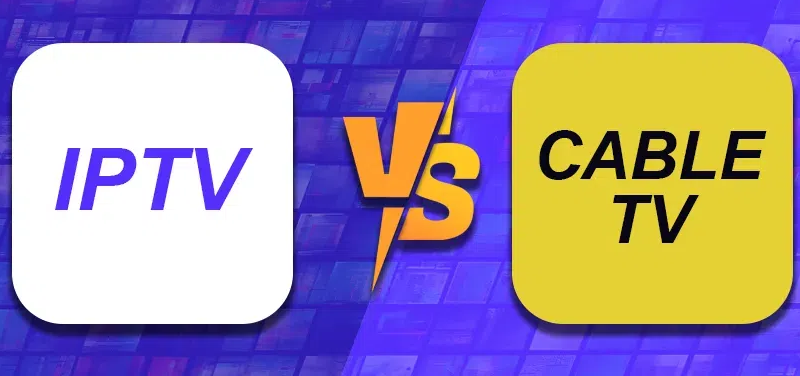The way we consume television has evolved dramatically over the years. With the rise of Internet Protocol Television (IPTV) and the continued presence of traditional Cable TV, many viewers are left wondering which option is better for their needs. In this comprehensive guide, we’ll compare IPTV vs Cable TV in terms of cost, channel variety, quality, and other key factors to help you decide which is the best choice for 2025.
What is IPTV and Cable TV?
IPTV (Internet Protocol Television)
- IPTV delivers television content over the internet instead of traditional cable or satellite systems.
- It allows users to stream live TV, on-demand videos, and even record shows.
- Popular IPTV services include Hulu Live TV, Sling TV, YouTube TV, and Xtreme HD IPTV.
Cable TV
- Cable TV uses coaxial cables to deliver television programming to your home.
- It has been the standard for decades and offers a wide range of channels, including local and premium networks.
- Major providers include Comcast Xfinity, Spectrum, and Cox Communications.
IPTV vs Cable TV: Key Comparisons

1. Cost
IPTV
- Generally more affordable than Cable TV.
- Monthly subscriptions typically range from $10 to $20, depending on the provider and package.
- No additional hardware costs if you already have a smart TV or streaming device.
Cable TV
- Often comes with higher monthly fees, ranging from $50 to $150+.
- Additional costs include equipment rentals (e.g., cable boxes) and installation fees.
Winner: IPTV is the clear winner for cost-effectiveness.
2. Channel Variety
IPTV:
- Offers a wide range of channels, including international and niche options.
- Many IPTV services allow you to customize your channel lineup, so you only pay for what you watch.
- Some providers offer thousands of channels, including premium networks like HBO and ESPN.
Cable TV:
- Provides a comprehensive selection of local, national, and premium channels.
- However, channel packages are often bundled, meaning you may pay for channels you don’t watch.
Winner: It’s a tie. IPTV offers more flexibility, but Cable TV provides reliable access to local channels.
3. Streaming Quality
IPTV:
- Quality depends on your internet connection. With a stable high-speed connection, IPTV can deliver HD, 4K, and even 8K streaming.
- Buffering can occur if your internet is slow or unstable.
Cable TV:
- Offers consistent picture quality without buffering, as it doesn’t rely on internet connectivity.
- However, Cable TV may lag behind in offering 4K and 8K content compared to IPTV.
Winner: IPTV wins for quality if you have a strong internet connection.
4. Flexibility and Convenience
IPTV:
- Watch content on multiple devices, including smartphones, tablets, smart TVs, and laptops.
- Offers features like on-demand content, catch-up TV, and cloud DVR.
- No long-term contracts; cancel anytime.
Cable TV:
- Limited to watching on your TV unless you have additional equipment.
- Often requires long-term contracts and early termination fees.
Winner: IPTV is more flexible and user-friendly.
5. Reliability
IPTV:
- Relies on your internet connection, so outages or slowdowns can disrupt service.
- Some IPTV providers may face legal issues, leading to service interruptions.
Cable TV:
- More reliable for live TV, as it doesn’t depend on internet connectivity.
- Less prone to outages caused by internet issues.
Winner: Cable TV is more reliable for uninterrupted viewing.
6. Additional Features
IPTV:
- Advanced features like multi-screen viewing, parental controls, and personalized recommendations.
- Access to apps and streaming platforms (e.g., Netflix, Amazon Prime) in one place.
Cable TV:
- Limited to traditional TV features unless paired with additional streaming devices.
Winner: IPTV offers more modern and advanced features.
Who Should Choose IPTV?
- Budget-conscious viewers: IPTV is more affordable than Cable TV.
- Tech-savvy users: If you enjoy streaming on multiple devices and want advanced features.
- International viewers: IPTV offers a wide range of international channels.
- Cord-cutters: Those looking to ditch traditional Cable TV for a more flexible option.
Who Should Choose Cable TV?
- Traditional viewers: If you prefer a straightforward, no-frills TV experience.
- Reliability-focused users: Cable TV is less dependent on internet connectivity.
- Local channel enthusiasts: Cable TV often provides better access to local networks.
Future Trends in 2025
- IPTV Growth: With the expansion of high-speed internet and 5G, IPTV is expected to dominate the market.
- Cable TV Decline: Cable TV subscriptions are likely to continue declining as more viewers switch to streaming.
- Hybrid Models: Some providers may offer a mix of IPTV and Cable TV to cater to diverse audiences.
Conclusion: Which is Better in 2025?
The choice between IPTV and Cable TV ultimately depends on your preferences and needs:
- Choose IPTV if you want cost savings, flexibility, and advanced features.
- Choose Cable TV if you prioritize reliability, local channels, and a traditional TV experience.
As we move into 2025, IPTV is poised to become the preferred choice for most viewers, thanks to its affordability, convenience, and ever-improving technology. However, Cable TV still holds value for those who prioritize stability and local content.

